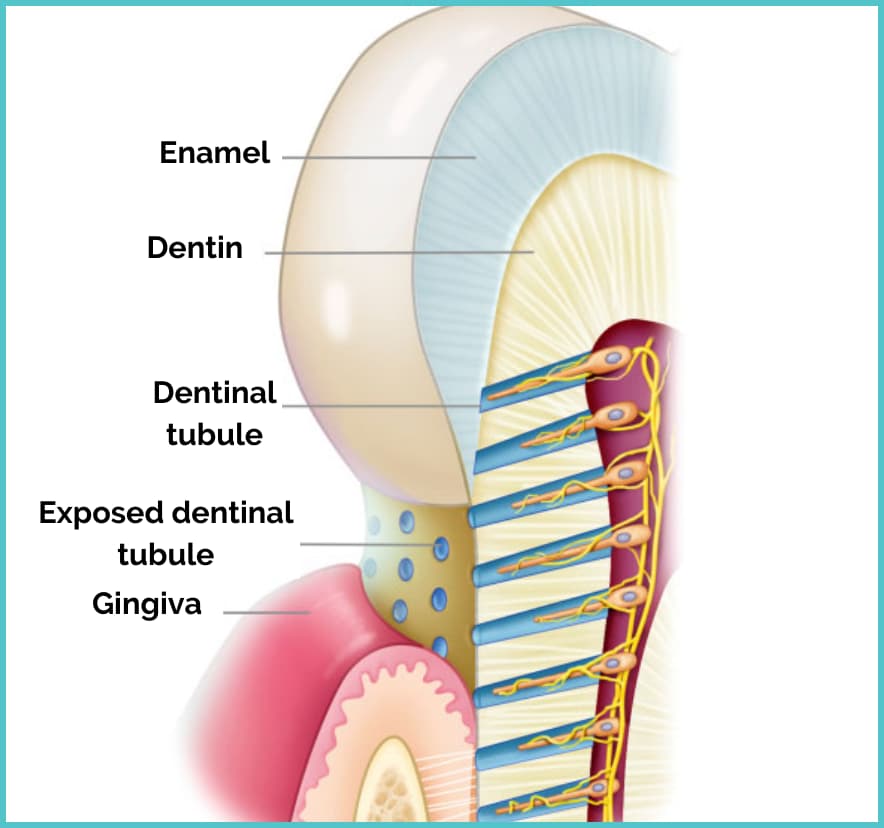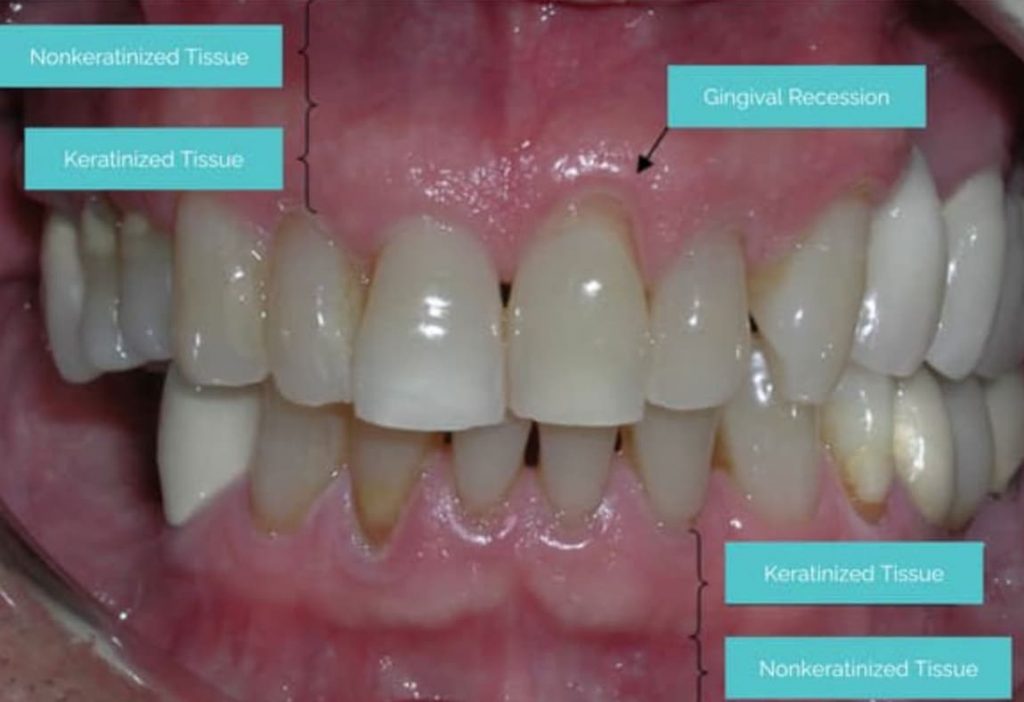Tooth sensitivity is a fairly common problem that many people have experienced in their lives. There are a number of reasons why it can happen, such as an unhealthy diet or even the way you brush your teeth.
While sometimes it’s temporary and a side effect of dental treatments, other times, it can be a sign of something far more problematic like gum disease. And if you don’t tend to the problem in time, it can fester and worsen your oral health.
Therefore, tooth sensitivity, even though it might seem insignificant, isn’t something that should be ignored. It’s important to know about its different signs and symptoms and causes, so you can seek timely treatment. In this guide, you’ll learn more about it.
What Is Tooth Sensitivity?
Tooth sensitivity is when the dentin – the middle layer between the enamel and the pulp – of the tooth is exposed, causing sharp pain or discomfort. The reason why it happens is that dentin is a tubular structure. It has these microscopic channels which allow for communication between the centre of the tooth (pulp) and the enamel and cementum.
When the protective layer of the enamel is removed, these tubules are exposed, which are, in turn, believed to stimulate the nerves inside the tooth, causing sensitivity. Even so, it’s not exactly understood how it is that dentin exposure results in tooth sensitivity. One widely accepted theory about it is called the “hydrodynamic theory.”

According to it, stimuli, such as heat or pressure, cause a change in the flow of the fluid inside of the dentinal tubules. This stimulates nerves present at the border of the pulp and dentin, which then cause the sensation of pain.
According to a review published in the Journal of Dentistry, dentin hypersensitivity usually tends to affect canines and premolars. It’s also more common in patients between the ages of 30 and 40 and females more so than men.

What Are The Symptoms Of Sensitive Teeth?
Sensitive teeth can experience pain and discomfort as a result of exposure to the following:
- Hot food or drink
- Cold food or drink
- Sweet or sour food or drink
- Cold air (you might feel it more intensely on sucking it in)
- Mouthwash with alcohol
- Brushing or flossing

Of course, sensitivity can also be accompanied by other symptoms depending on the underlying cause of it. For instance, if you have gum disease, it can also cause bad breath, bleeding, swelling, gum recession, loose teeth, etc.
Why Do Teeth Become Sensitive?
Sensitive teeth pain can be a result of a number of factors, some of which are mentioned below:
Gum Disease & Recession
Gum disease can pull away the gingiva anchoring the teeth in place. It can expose the roots of the teeth and the loss of the cementum covering these roots can result in severe tooth sensitivity.

Gum disease can be caused by reasons, such as age, poor hygiene and diet, use of tobacco, teeth grinding, and teeth misalignment, among other factors. Also note that recession can also be triggered by things such as aggressive brushing or gum piercings, so you should be careful about that as well. Gum recession can lead to extreme tooth sensitivity.
Tooth Extraction
Sensitivity after tooth extraction is a reported complaint. According to the NHS, it’s actually common for the adjacent tooth to feel sensitive to food and drinks after an extraction. This can cause pain and as reported in research published in the Journal of Dental Anesthesia and Pain Medicine, it can happen due to:
- Injury to the tooth during extraction
- Dislocation of a restoration
- Loosening of teeth (subluxations)
- Fracture of crown
Dental Filling
Sensitive tooth after filling is also not unheard of. In fact, it’s a fairly common problem, which can happen due to the nerves inside the tooth being aggravated. It’s supposed to be a temporary problem that should be resolved in a matter of weeks. Tooth sensitivity after filling can be stimulated by air, sweet foods, and temperature changes.
But you should also know that there can be more serious causes of a sensitive tooth after filling, such as an allergic reaction to the material, inflammation of the tooth pulp, problems with your bite, etc. If you have a tooth that’s sensitive after filling, make sure to consult your dentist.
Teeth Whitening
After you’ve had a professional in-office teeth whitening, you might experience sensitivity because of the bleach used for the treatment. Some sensitivity is considered normal. But your teeth can be sensitive to hot and cold foods and drinks and even cause pain. While this should go away with time, sometimes teeth whitening can do more long-term damage.
The NHS warns that there’s a risk of harm to the enamel from the teeth whitening kits that are used at home. With damage to the enamel, keep in mind, that your dentin will be exposed which will cause sensitivity.
Tooth Shaving
Teeth shaving is done as a part of some cosmetic and/or restorative treatments, including dental veneers, crowns and bridges. Sensitivity after crowns and veneers is considered normal. It can also last for as long as 3 months. But it is something that should get better with time.

If you continue to experience painful sensitivity, it can be the result of:
- Ill-fitted restoration
- Tooth decay
- Gum disease
- Infection
- Irritation from the dental cement
- Malocclusion
- Teeth grinding
- Procedural trauma
Trauma
Dental trauma from things such as accidents and injuries can also leave the dentin exposed and it is one of the tooth sensitivity causes. There can be other sources of trauma as well, such as:
- Teeth-grinding or bruxism
- Brushing your teeth too hard
- Using an abrasive toothpaste
- Using your teeth as a tool
- Consuming sugary and acidic foods (and even using acidic mouthwashes)
- Acid reflux
Cavities
One of the symptoms of dental cavities can be tooth sensitivity. The same thing happens here as well. As a result of tooth decay, the loss of enamel can give way to the dentine tubules being exposed. It can leave your teeth or tooth sensitive to cold, hot, and/or sweet foods.
How To Alleviate Tooth Sensitivity?
Tooth sensitivity can be very discomforting, which is why many people try to alleviate the pain at home using different remedies. In such a scenario, it’s important to consult your dentist as soon as possible.
You might be advised to use what’s known as “desensitising toothpaste,” which can contain different ingredients like potassium chloride, arginine, calcium carbonate, potassium nitrate, and strontium acetate.
They can block the dentin tubules or affect nerve conduction, which can provide you relief from sensitivity, according to a study published in the International Dental Journal. Other than that, some kitchen staples like garlic, turmeric and green tea are also believed to help, but you should best talk to your dentist.
In the meantime, you should be careful about acidic and sweet foods and the way you’re brushing your teeth (don’t use an abrasive toothpaste or a hard-bristled brush). Also, if you have a teeth-grinding problem, make sure to wear a night guard.
How To Treat Sensitive Teeth?
There’s no one tooth sensitivity treatment as the course of action can vary depending on the underlying cause of the problem. It may be one or more of the following:
- Scaling and root planing – If sensitivity is a result of hardened plaque around gums, that needs to be cleaned.
- Fluoride treatment – Especially in the case of cavities, a fluoride foam, varnish or gel can help rebuild and strengthen the enamel.
- CPP–ACP – It’s a milk product that’s also used for remineralising the teeth.
- Bonding – Dentine bonding agents can help with not just the sensitivity but also the pain. It may be used to cover a damaged tooth or exposed tooth roots.
- Root canal – Since the nerves inside the tooth are responsible for causing hypersensitivity (if your dentist deems it appropriate), a root canal might be done to remove the nerves in the tooth.
- Graft – Gums cannot grow back, so if they’ve receded to a point where it’s affecting your oral health, a gum graft surgery might be recommended to cover the teeth again.
Only your dentist can recommend you the best sensitive tooth treatment, so make sure to follow their instructions. On your end, make sure to not aggravate your oral health and take good care of your oral hygiene.
Conclusion
Even one sensitive tooth can be quite problematic. That’s because it can affect your ability to eat food comfortably. And if it’s accompanied by pain, it may affect your day-to-day activities as well.
While sometimes, it can be caused by dental treatments themselves, at other times, it can be a sign of something more serious like a gum disease, infection or cavity. And if you don’t get the problem addressed in time, it can worsen.
So, if you have sensitive teeth, make sure to get in touch with an experienced and board-certified dental professional.
Reviewed and approved by Dr Izbel Aksit.
FAQ
Can a chipped tooth cause sensitivity?
If your tooth is chipped to the point where your dentin is exposed, it can cause sensitivity.
Can a cold cause tooth sensitivity?
A cold can cause a sinus infection (sinusitis), which can cause teeth sensitivity.
Can a sensitive tooth heal itself?
In certain instances, tooth sensitivity can (and should) resolve on its own, such as after a tooth filling, crown/veneer treatment, root canal, and extraction. But that’s not always the case, especially if you have an underlying health issue like cavities, infection, or gum disease.
Can clenching cause tooth sensitivity?
Teeth clenching and grinding can damage the enamel, expose the dentin and cause sensitivity.
Can coffee cause tooth sensitivity?
Tooth sensitivity to cold or hot coffee can happen if your dentin is exposed due to one reason or another, such as trauma, cavities, gum problems, etc.
Can stress cause tooth sensitivity?
If stress is making you grind and clench your teeth, the damage to the enamel from that can eventually cause tooth sensitivity.
How long does tooth sensitivity last?
It depends on what caused the sensitivity in the first place. If it’s because of a dental treatment, it might take a few days, weeks or even months (can depend on the treatment). In other cases, you’d need to resolve the underlying issue for sensitivity to go away.
Does tooth sensitivity go away?
In some cases, tooth sensitivity can go away on its own. However, this isn’t always the case. If you have an underlying oral health issue, you must get it treated.
How to decrease tooth sensitivity?
There are different ways in which tooth sensitivity might treated from desensitising toothpaste, fluoride treatment, bonding agents, and CPP-ACP to surgical procedures like root canals or gum grafts.
